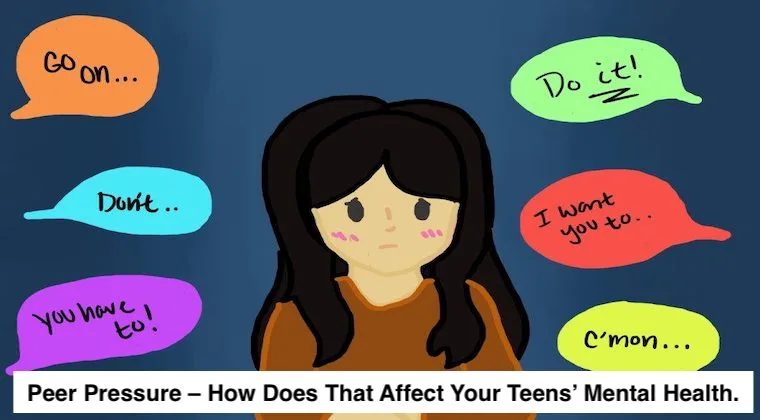+1 845 259 2974 (11 a.m to 7 p.m CST)
Peer Pressure – How Does That Affect Your Teens’ Mental Health

During adolescence, peer pressure becomes a prominent influence, shaping teenagers' choices in various aspects of life, from clothing preferences to social behaviors. Understanding this phenomenon is essential as it profoundly impacts adolescents' development and decision-making processes. Equally imperative is the recognition of the critical need to address mental health concerns among this demographic. Adolescence often serves as a crucible for mental health challenges, with issues such as anxiety, depression, and self-esteem struggles manifesting during this transformative phase.
Fostering positive mental well-being during adolescence not only enhances immediate quality of life but also lays the foundation for long-term resilience and psychological health. Let’s delve into the intricate relationship between peer pressure and mental health in teenagers, highlighting the importance of proactive intervention. Let’s explore how monitoring apps can serve as invaluable tools in identifying and addressing mental health issues, offering insights and support to both adolescents and their caregivers.
Understanding Peer Pressure
Peer pressure is the influence exerted by a peer group, encouraging individuals to change their attitudes, values, or behaviors to conform to group norms. It is a powerful force in the social development of teenagers, often shaping their decisions and actions.
Common sources of peer pressure among teens include:
There are certain things that can lead to peer pressure thus making things worse for the teens, such as:
- Classmates and friends may push each other to excel or, conversely, to skip studies.
- The pressure to achieve high grades and excel in extracurricular activities.
- Friends influence fashion, music, and lifestyle choices.
- Encouragement to fit in through similar behaviors, like partying or social media trends.
- Teammates may pressure each other to perform or participate in certain rituals.
- The drive to win or be the best can create intense pressure.
Each of these sources can profoundly impact how teens feel and act, pushing them towards decisions they might not make independently.
Effects of Peer Pressure on Mental Health
Peer pressure significantly impacts teen mental health, manifesting in both detrimental and beneficial ways.
Negative Impacts:
- Stress: Constant pressure to conform can overwhelm teens, leading to high stress levels.
- Anxiety: Fear of exclusion or failure to meet peer standards can cause severe anxiety.
- Depression: Chronic peer pressure may result in depression from sustained negative self-esteem and isolation.
Positive Impacts:
- Motivation: Positive peer influence can motivate teens to excel in academics and personal development.
- Healthy Competition: Competition among peers can promote personal growth and push teens to improve their abilities.
Role of Monitoring Apps
Monitoring apps serve as a useful tool for parents to safeguard their teens and ensure their well-being.
How Monitoring Apps Can Help Parents:
- Apps allow parents to understand their teen's social interactions and intervene when necessary.
- They provide alerts to parents about potential harmful behaviors, helping to prevent negative outcomes.
Types of Behaviors Monitoring Apps Can Track:
- Location and Communications: Monitoring apps can track the teen's location and their communication on social media and text.
- Application Usage: These apps can also monitor how teens use other applications on their devices, which can indicate changes in behavior or mood.
These tools empower parents to maintain oversight while respecting their teen’s autonomy and privacy.
Benefits of Using a Monitoring App
Using a monitoring app can provide significant advantages for ensuring the safety and well-being of teenagers. One of the primary benefits is the early detection of harmful behaviors. These apps can alert parents to potential issues such as cyberbullying, inappropriate online relationships, or substance abuse before they escalate. Furthermore, monitoring apps can strengthen communication between parents and teens. They offer a basis for discussing online activities and setting boundaries, which can help foster a more open and trusting relationship.
Limitations and Ethical Considerations
Despite their benefits, monitoring apps come with limitations and ethical concerns. Privacy concerns are at the forefront, as excessive monitoring can lead to an invasion of privacy and diminish a teen’s sense of independence. Additionally, the importance of trust and open dialogue cannot be overstated. Reliance on technology for parenting can potentially undermine the trust between a parent and child if not used judiciously. Open communication about the use of such apps can help balance oversight with respect for the teen’s autonomy.
Peer pressure is a significant factor influencing teen behavior and mental health. It can lead to both negative outcomes like stress and depression, and positive ones such as motivation and healthy competition. Monitoring apps present a valuable tool for parents, enabling them to detect harmful behaviors early and foster stronger communication with their teens. However, it's crucial to balance the benefits of these apps with ethical considerations such as privacy and trust. Parents should use monitoring apps judiciously, ensuring they maintain open dialogue with their teens to build trust and respect their autonomy. This approach will help mitigate the risks of peer pressure while supporting teens in their growth and development.





















